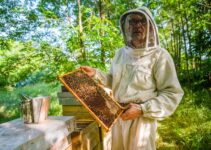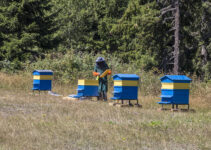Learning how to become a beekeeper is not something you can achieve through a theoretical course alone. Practical, hands-on experience is a crucial part of any beekeeper’s training. A beekeeping internship is one way to get this practical exposure, but how does it work, and how do you get an internship?
A beekeeping internship is informal training with an experienced beekeeper on certain aspects of beekeeping. It is not comprehensive education on all aspects of beekeeping. To get an internship, ask an experienced beekeeper to let you assist in activities where you need to increase your knowledge.
Beekeeping has regional variances that are not taught in theoretical classes or scientific textbooks. Consequently, practical hands-on training is an important part of learning beekeeping. Learning from experienced beekeepers is the only way to get this valuable knowledge without making the same mistakes as you learn to keep bees, and an internship is a good option.
How Does A Beekeeping Internship Work?
Practical hands-on experience is crucial when learning the ropes as a beekeeper. It is difficult to learn how to identify the age of eggs in cells, the difference between capped brood and capped honey, and assess the health of a colony without seeing the inside of a hive yourself.
Combine the practical experience with the guidance of an experienced beekeeper, and you will fast-track your beekeeping development!
A beekeeping internship is particularly useful for aspiring beekeepers who do not have the time to commit to a full-time apprenticeship. Hobbyist beekeepers or beekeepers that have a day job may be unable to take up an apprenticeship, but an internship can be a viable alternative.
The following characteristics of a beekeeping internship may cause some beekeepers to select this route to gain practical experience.
Beekeeping Internships Are Part-Time.
An internship with a beekeeper means you will participate in certain beekeeping activities under the guidance of the beekeepers on an ad-hoc basis. When the beekeeper performs a certain activity you need guidance in, you can participate in that particular activity to gain experience.
For example, if the beekeeper is repairing used hives for the next season, you can participate in the activity to learn the process and the methods. Likewise, if the beekeeper is performing hive inspections, you can join that activity and gain experience.
Beekeeping Interns Are Not Paid
In a beekeeping internship, the intern does not receive monetary compensation for the work done. The arrangement is a trade-off where the intern benefits from the beekeeper’s knowledge and learns a new aspect of beekeeping, and the beekeeper benefits by receiving free help on beekeeping tasks.
Internships are similar to short courses on certain aspects of beekeeping without paying for the formal tuition.
Beekeeping Internships Have No Training Structure
A beekeeping apprenticeship may have a structured learning program where the student progresses from one beekeeping process to the next to learn the activity in planned stages.
In a beekeeping internship, the student will participate in whatever beekeeping task the beekeeper is busy with at that time of the year.
The informal nature of internship training may result in taking longer to learn the full scope of beekeeping than the intensive training in a more formal approach of an apprenticeship.
Beekeeping Internships Are Short-Term
Beekeeping internships are usually of a shorter duration than apprenticeships, typically lasting a few weeks or a few months at a time.
Internships are geared towards learning a particular aspect of beekeeping rather than in-depth training in beekeeping from start to finish.
Internships can be flexible for aspiring beekeepers that can target specific gaps in their beekeeping knowledge and concentrate on improving their practical knowledge in that area rather than other areas of beekeeping where they are already competent.
Beekeeping Internships Do Not Offer Credentials
An internship is an informal approach to learning beekeeping and therefore does not lead to any credentials at the end of the process.
An apprenticeship, in contrast, is a formal program and often comes with credentials at the end of the apprenticeship that can be used towards the credibility of your beekeeping education.
You Can Intern With A Hobbyist Beekeeper
Internships imply that you learn from someone who is more experienced in the activity than you are, which applies to beekeeping internships as well.
This characteristic of a beekeeping internship and the informal training means that you can intern with a hobbyist beekeeper who has more experience than you.
Beekeeping apprenticeships generally are with commercial beekeepers that produce an income from beekeeping and can pay the apprentice.
Some commercial beekeeping operations will take on interns and give short-term practical experience training to aspiring beekeepers in exchange for the labor. However, the same rules of non-payment will apply.
Is A Beekeeping Internship Better Than An Apprenticeship?
Beekeeping internships are better for hobbyist beekeepers interested in learning more about beekeeping but don’t want to make beekeeping their business.
An internship can also help an aspiring beekeeper get into beekeeping and gain basic knowledge before applying for a formal beekeeping apprenticeship to become a commercial beekeeper.
A beekeeping apprenticeship is better for a person who knows they want to pursue a career as a beekeeper and wants to begin their formal practical training. Apprenticeships may also teach aspects of beekeeping, such as providing pollination services, which internship programs may leave out.
Your personal beekeeping goals will determine the answer to the question of whether a beekeeping internship is better than an apprenticeship.
To learn more about beekeeping apprenticeships, read our article “What Is A Beekeeping Apprenticeship + How To Get On One?“
The Best Way To Get A Beekeeping Internship
A beekeeping internship is an informal arrangement between the experienced beekeeper and the intern. This implies there is a level of trust between the two parties, which generally means the two people know each other at some level.
The best way to get to know experienced beekeepers who would be willing to offer short-term internships is to frequent the places where these beekeepers hang out.
Local beekeeping association meetings are a good place to start and get to know some of the prominent and experienced beekeepers in your area.
Most experienced beekeepers are willing to share their knowledge and welcome an extra pair of hands on labor-intensive beekeeping tasks.
Many beekeeping associations organize training sessions where the experienced beekeepers in the group will tutor the newcomers and give them practical exposure to specific beekeeping tasks.
This can be an alternative way to gain practical experience without formalizing an internship arrangement, but dedicated one-on-one time with an experienced beekeeper is invaluable!
Conclusion
Beekeeping is a practical activity that requires practical experience to complement theoretical knowledge. It is difficult to gain this experience on your own, which makes a beekeeping internship a good way to fast-track your practical beekeeping experience and avoid newbie mistakes.
Speak to your local beekeepers and ask if you can help with beekeeping tasks where you exchange free labor for the knowledge shared by those with practical experience!
References
Writer’s personal experience.
https://www.joeproduce.com/jobs/wonderful-orchards/beekeeper-apprenticeintern
https://www.arc.agric.za/arc-ppri/pages/insect%20ecology/poverty-relief.aspx




